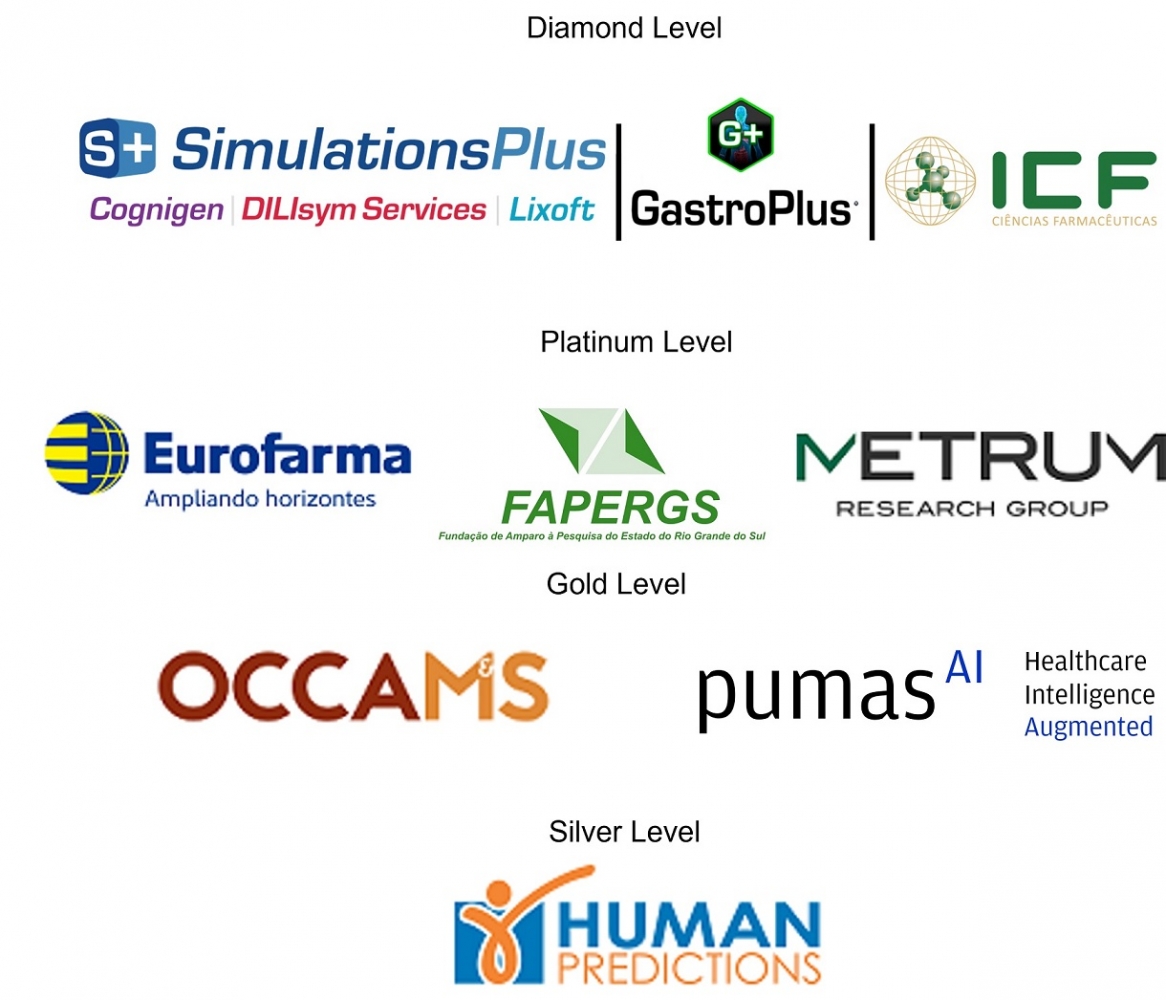Pre-Congress Workshops
Pre-congress workshops - October, 3rd and 4th
9:00 a.m. to 12:30 p.m. and 2:00 p.m. to 6:00 p.m.
During registration process, choose ONLY ONE option for pre-congress workshop. The workshops will take place simultaneously. Workshops have limited vacancies and will be assigned on a first-come, first-served basis.
Participants need to bring their own laptops with browser.
Workshop 1
Course on Population Pharmacokinetic and Pharmacodynamic Analysis
Speakers Iñaki F. Trocóniz and Manuel Ibarra
Objective: The aim of this workshop is to introduce the concepts, notions and basic skills needed to get involved and perform population pharmacokinetic/pharmacodynamic/disease analyses using nonlinear mixed effect models with the software NONMEM.
The target audience of this Workshop is broad including academics, regulators, drug developers and clinicians. Basic knowledge in pharmacokinetics and pharmacodynamics is highly recommended.
Outline
- Introduction to population analysis
- Nomenclature, Concepts, and Scope
- Leveraging available information
- Dataset requirements and organization
- Model implementation
- Biopharmaceutic, Pharmacokinetic, Pharmacodynamic, and disease progression models
- Model evaluation, validation, and exploration
- Goodness of fit plots, simulation-based diagnostics, bootstrap analysis
- Reporting of results
- Case studies
- Clinical pharmacokinetics of antibiotics in critical patient populations
- Tumor growth inhibition and myelosuppression
NONMEM, PsN, Xpose, and Piraña will be used as support for theory and examples
Language: Spanish
Max number of participants: 20
Workshop 2
GastroPlus Workshop on PBBM
Speaker Daniela Amaral Silva and Jim Mullin
Day 1
8:30 a.m. – 10:30 a.m. BRT: Introduction to Physiologically Based Biopharmaceutics Modeling Using GastroPlus
10:30 a.m. – 11:00 a.m. BRT: Coffee Break
11:00 a.m. – 12:00 p.m. BRT – Mechanistic Absorption Modelling Considerations
12:00 p.m. – 2:00 p.m. BRT: Lunch
2:00 p.m. – 3:30 p.m. BRT – Mechanistic Dissolution Modelling Considerations Part 1
3:30 p.m. – 4:00 p.m. BRT: Coffee Break
4:00 p.m. – 5:30 p.m. BRT: Mechanistic Dissolution Modeling Considerations Part 2
Day 2
8:30 a.m. – 10:30 a.m. BRT: Mechanistic IVIVCs & Virtual Bioequivalence Part 1
10:30 a.m. – 11:00 a.m. BRT: Coffee Break
11:00 a.m. – 12:00 p.m. BRT – Mechanistic IVIVCs & Virtual Bioequivalence Part 2
12:00 p.m. – 2:00 p.m. BRT: Lunch
2:00 p.m. – 3:30 p.m. BRT – Food Effect Modeling
3:30 p.m. – 4:00 p.m. BRT: Coffee Break
4:00 p.m. – 5:30 p.m. BRT: Complex Generics: “The Next Frontier”
Note(s): Simulations Plus will set up a cloud server. Will have hands-on activities.
Language: Portuguese and English
Prerequisite: Assuming mixed audience of beginners and advanced.
Max number of participants: 20
Workshop 3
Introduction to mrgsolve: Hands on tutorial
Speaker Ana Ruiz
Day 1
Morning
*R Basics:
*Getting started with R
*Handling Datasets
*Data Objects
*Data Manipulation
*tidyverse
*ggplot2
-Getting started
-Creating Plots
-Controlling the appearance of plots
Afternoon
*Starting with mrgsolve:
-Online resources
-Model components
-Model specification
-Input data
Day 2
Morning
*Absorption Models
*Infusion Models
*Simulations
Afternoon
*Bootstrap Data
*Forest Plots
*A Bioequivalence Trial
Language: Spanish
Level: beginners Prerequisite: basic pharmacokinetics
Max number of participants: 20
Workshop 4
PK-Sim - Hands on workshop
Speaker José David Gómez Mantilla
From opening the software to model applications and qualification
Day 1
-Principles of PBPK
-OSP Project
-Model building
-Data handling and Parameter optimization
-Individual and Population Simulations
-Drug Drug Interactions
-Model and Network qualification and validation
Day 2
-DDI extrapolations
-Special populations
-Model extrapolation
-Strenghts and limitations
-Wrap-up
Language: Spanish
Max number of participants: 20
Workshop 5
Introduction to Pumas: Fast 1-stop shop for Data Wrangling, Visualization, and PKPD modeling in Julia
Speakers Valvanera Vozmediano Esteban, Jose Storopoli and Joga Gobburu
Day 1
9:00 a.m. – 9:30 a.m.: Setting up the Workspace
How to access JuliaHub & launch an instance, the layout of program window/REPL, how to create a Pumas model file, how to upload data, how to organize your workspace 9:30 a.m. – 11:15 a.m.: NCA & BE
Data import, creating an NCA population, performing NCA, generating a report, creating summary tables, applying to bioequivalence trials
11:15 a.m. – 12:30 p.m.: Population PK Modeling Part 1
Creating a population, components of a Pumas model, initial estimate exploration
12:30 p.m. – 2:00 p.m.: LUNCH
2:00 p.m. – 3:45 p.m.: Population PK Modeling Part 2
Model fitting, report generation, output individual PK parameter estimates, individual/population predicted concentrations, and covariate models
3:45 p.m. – 4:30 p.m.: Submitting Pharmacometrics Work to Regulatory Agencies. Here is what you need to know to succeed.
Day 2
9:00 a.m. – 9:30 a.m.: Model Diagnostics Part 1 - Plotting
Goodness of fit plots Plotting features to visualize observed data, perform covariate analysis, and perform any additional model analysis plots 11:15 a.m. – 12:30 p.m.: Model Diagnostics Part 2 – Model Assessment
Bootstrap simulation, visual predictive check, quantitative predictive check
12:30 p.m. – 2:00 p.m.: LUNCH
2:00 p.m. – 3:00 p.m.: Sequential PKPD
How to use individual PK parameter estimates as model inputs, PD model set up, different PD model variations, perform PD model analyses & post-processing
3:00 p.m. – 4:00 p.m.: Data Wrangling
Basic Julia syntax, data input and output, dataframes manipulation, grouping/subset, and summary statistics
4:00 p.m. – 4:30 p.m.: Role of Modeling and Simulation to Enter US Markets
Level: For beginners and experienced individuals
Prerequisites: Basic PKPD understanding. After registration, participants will be sent a link with certain pre-requisites to be completed before attending the course. Pumas is free to use for academic purposes and these pre-requisites cover mostly how to get access to Pumas.
Language: English, but you can ask questions in Portuguese or Spanish
Max number of participants: 20



